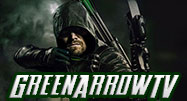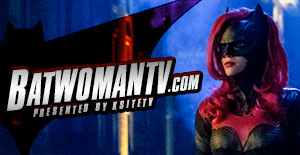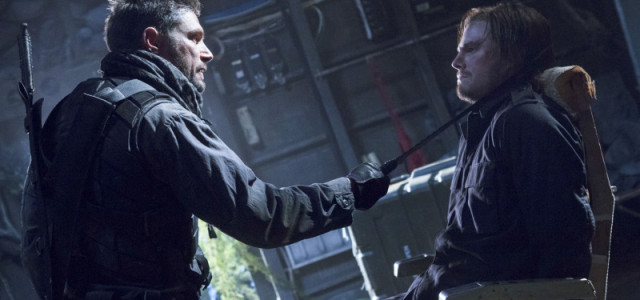
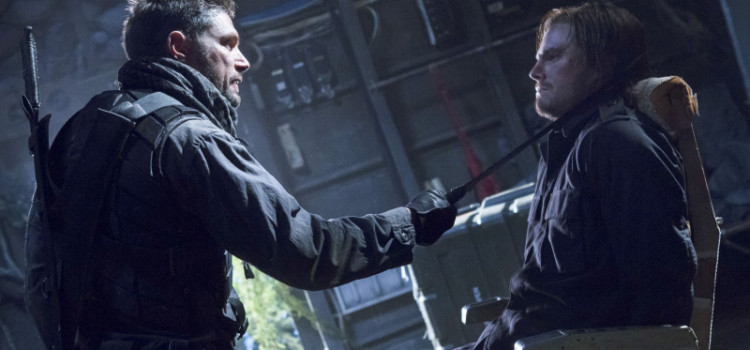
Arrow #1.13 “Betrayal”/#1.14 “The Odyssey” Review
Recaps & Reviews February 28, 2013 Derek B. Gayle

In an effort to cover the complete series, GreenArrowTV will be catching up with missed weeks of reviews with double features this week. Keep an eye out for a “Dodger”/”Dead to Rights” review from Matt later on.
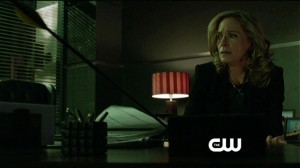 Summary: Two episodes offer game-changer after game-changer, as the exact plot developments and character inclusions we’ve been itching to see finally unfold. The series is finally taking shape.
Summary: Two episodes offer game-changer after game-changer, as the exact plot developments and character inclusions we’ve been itching to see finally unfold. The series is finally taking shape.
If you have not seen these episodes yet and do not wish to be spoiled, do not continue reading!
Read in-depth recaps of “Betrayal” and “The Odyssey” on our handy episode guide!
“Betrayal” Review
In “Betrayal,” we have a particularly strong example of the show utilizing almost all of its full cast (save for Thea, who just recently got the spotlight.) Everyone plays a relatively key role in the story, moving things along even slightly without it feeling terribly forced. The episode carries a nicely well-crafted theme, too; Oliver feels betrayed by Moira (after feeling betrayed by Diggle,) Tommy by Laurel, Laurel by Quentin. The show created a heavily Shakespearean tragedy style of storytelling right from the get-go, so it’s about time all these family secrets came to a head.
The major one that’s been teased since that final scene in the pilot, however, is between Oliver and Moira. None of us at GreenArrowTV have held back on our love for Susanna Thompson’s strikingly sympathetic performance as Moira, easily the breakout character of the show (behind Diggle and Felicity, perhaps), so the tension is inevitably going to be high. The show cheats a little bit, prolonging the inevitable confrontation for as long as possible. But it’s not a bad cheat, since it happens via a fake-out; Oliver completely believes his mother when she blames Robert for it all. It’d be a flimsy, but believable way to prolong the status quo for a while, but the show only uses it to create a false sense of security. There’s a level of padding to it, sure, but we also get to have our cake and eat it too, as we get a chance to see every possible scenario. Oliver confronts Moira as a son, and fails; Oliver hears about it via Diggle’s eavesdropping, and only gets more hurt; and finally, Oliver confronts her as the Hood. If he’d immediately skipped to that last one, he might come off a bit too unsympathetic, but instead we get the stepping stones to why he’d be armed and ready to put an arrow in his mom (or, you know, scare her a little.) Stephen Amell’s acting throughout this ordeal was phenomenal, particularly in his facial expressions when he listened to Diggle’s recording. And, of course, the final scene is nothing short of jaw-dropping.
Laurel/Katie Cassidy is still the weak link in the cast, but she was much less weak this time around thanks to some newfound (albeit temporary) story significance. We get a well-done fight sequence from her, where she’s only taken down because of a taser, keeping it believable (though subtle) that she could maybe become a crimefighter eventually. However, it’s disappointing that Laurel’s most promising development—playing an inside man for the Hood—has already been severed. Oliver’s misgivings make sense, but it also demotes Laurel back to irrelevant love interest status, which has been her big problem from the get-go. And even that aspect was more interesting as she was tied up in the hood; Tommy’s anger towards her lies might have been some forced drama, but it did provide organic drama for if/when either Tommy or Laurel find out the Hood’s identity. After all, Tommy doesn’t exactly like the Hood all that much. But at that, Laurel’s plot shines more of a light on Tommy than it does on her, which is a problem.
The same can be said for her father; even though Laurel begins at the center of things, it’s Quentin who gets the stronger scenes and development. Granted, Katie Cassidy and Paul Blackthorne are very good in their scenes together—some of the strongest of the hour—and it was welcome to have Quentin’s betrayal be brought up and executed to its fullest extent. While much of Quentin’s anger throughout the show has been justifiable, making Laurel a pawn, and thus putting her squarely in harm’s way, was the most reprehensible move he’s made thus far, and he’s not getting out of it that easily. Quentin isn’t irredeemable by any means, though. After all, he did realize his mistake, and for the first time was completely willing to work with the Hood. Even though it was for his daughter, that’s still a big step for him. He’s only ever seen black and white so far, and being willing to turn to his morally gray enemy for help is a big deal.
David Anders played his usual David Anders character—smarmy, suave, and full of British-but-not-actually-British swagger. Cyrus Vanch as he was portrayed was fairly bland, but we did get some unusually comical moments out of him. In particular, the cleverly edited sequence of Vanch describing his traps and protection as Oliver thwarted (almost) all of them was a kind of fun we hadn’t yet seen from the show.
The weeks since Arrow‘s return from hiatus have been chock full of daring moves and experimentation. They’ve been hit-or-miss in some places, but not to the extent of the first half, and anything that doesn’t work can be easily course-corrected. In the case of “Betrayal,” the show is finally honing in on what makes it work. It’s selling the soap opera elements of deception and betrayal, mixed with tinges of superhero action, but it’s also really opening up the characters. It’s the first time I’ve has felt this emotionally connected to the characters, mostly because by this point we’ve seen enough of them to get why they do what they do. Now it’s time to utilize that emotional connection for real drama, and the creators seem fully aware of this fact with that final scene. And, for the first time, we actually get a good use of the “You have failed this city!” mantra. That’s got to stand for something.
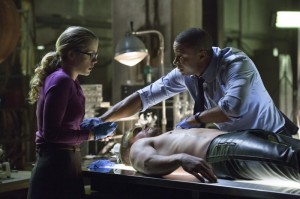 “The Odyssey” Review
“The Odyssey” Review
You know how I just mentioned that any weak spots could be easily course-corrected? If you’ve read just a couple of reviews here, it should be fairly apparent that there isn’t much love lost for the oft-irrelevant and misplaced island flashbacks. One of Arrow‘s biggest problems has been its inability to keep the flashbacks interesting beyond empty thrills, or tie them into the main plot thematically with the adeptness of how Lost or even Once Upon a Time handles their weekly flashbacks. So it’s ironic (and yet makes perfect sense) that the way to solve this is by expanding the flashbacks’ screentime. “The Odyssey” plays with the show’s structure for the first time, doing an A/B-plot structure flip that’s sort of a cross between the classic Buffy episode “The Zeppo” and some of Lost‘s more mindbending flashback episodes. The present becomes merely a frame story for the elongated flashback, one which is no longer hindered by time constraints or vaguely shoehorned-in themes.
It skirts past the big cliffhanger of “Betrayal,” in that we don’t get as big of a confrontation as we were promised. But what we get is still very smart; for one, Moira shooting (and nearly killing) her own son is both ridiculous and chilling. And even better, we get a decent (albeit kind of flimsy) justification for why Moira’s officially “off-limits” to the Hood in spite of the proof. It all still plays into Oliver’s stubbornness, but it’s understandable stubbornness, considering how close he and his mother have gotten over the course of the season. It’s a little bit of wheel-spinning, sure, but it’s justified in this case.
The “character fighting for his life as he dreams of the past” frame story is nothing new, but it’s spiced up by throwing Felicity into the mix. While it’s a development that we’ve speculated since her introduction, the brisk way she was thrown into right from the episode’s start was an unforseen jolt. Felicity doesn’t get much of an introduction into the world, but the way she’s forced to do some intense stuff right from the get-go is a smart way to bypass any melodramatic reactions. And let’s face it, “Everything about you just became so unbelievably clear” was the perfect line to encapsulate her little journey. It should come as no surprise, but Felicity’s inclusion on the team is a welcome development.
In the flashback, we get much more interesting training scenes than earlier episodes’ tendency to have Oliver running, falling and complaining. He still does all of those things here, but it’s spiced up by the presence of Manu Bennett as Slade Wilson, who’s the most charismatic (and good-looking) version of Deathstroke of, well, probably anything. Turning Deathstroke into more of a concept is an odd route to go, but it makes sense of the very comic book-y outfit, which has been as-of-yet unmatched in its weird colorfulness. Deathstroke is meant to stick out and be a face the victim will remember, so its relative outlandishness is justified. This also yields much-needed development for the enigmatic villain—well, not quite the same one we met earlier in the season, but a Deathstroke.
While fans have been excited over the likes of David Anders, Tahmoh Penikett, Seth Gabel and other fan-favorites, Manu Bennett strikes a rare balance of both fitting into the world and being remarkably fun to watch. Part of it is because he’s written as the snarky, sarcastic character that’s been missing from Arrow. And really, he’s pretty close to what Oliver ought to be eventually. But Bennett himself really sells it, playing up the broken/determined angle that we get from Oliver in the present, while still being the type of person we can enjoy watching. It’s important for making him sympathetic when he’s at his most brutal, but it also makes him a clear foil to Oliver; in a sense, he’s exactly what Oliver becomes five years later. It’ll be interesting to see how this relationship is handled further down the line, but until then, more Manu Bennett is good news.
Byron Mann has gotten the short shrift most of the time, as Yao Fei is generally used as a plot device to confuse the already somewhat-convoluted island storyline. He’s still not much more than a Macguffin here, prompting Oliver’s rescue mission, but we do get actual insight that isn’t part of a fake-out of scheme. Seeing Yao Fei embrace his apparently abused captive daughter was a powerful moment, brief as it was, and was the first time Yao Fei has felt like more of a character we could root for than just another piece of the island puzzle.
All the The Odyssey allusions were very on-the-nose—it was the title of the episode, after all—but the tense moment between Oliver and Slade as they try to figure out the password is handled well-enough that it works. The comedic chemistry between Amell and Bennett cut some of the tension, and Oliver’s frantic correction of the line made the situation more believable (and was darkly funny.) It works in a more subtle way, too, paralleling Oliver’s own loss of humanity as his journey continues. He’s struggling to retain a sense of morality here, refusing to kill as much as he can, but the tragedy is that we all know how he inevitably turns out.
The production design of the island was fantastic throughout this installment. Now that we’re seeing it in bigger chunks, the huge scope of the island is much easier to appreciate. Kudos to the production crew for making this setting feel big, cinematic, and entirely believable. The major question at this point, though, is whether the conclusion of the island escapades will significantly dovetail into the main storyline. It gives Oliver some depth, which is important, and stories like this are interesting in a one-off kind of way, but its saturation in the show’s mythology means it’ll have to be something more than just red herrings and padding. As it stands, though, the storyline finally feels like something worth getting invested in, with its engaging flashback-only characters that make the convoluted plot worth watching. “The Odyssey” is exactly what the flashback sequences needed, and hopefully they’ll be used to better effect from here on out.
Odds & Ends
- The reason no one could legally do anything about Cyrus Vanch was because he hadn’t clearly committed a crime yet. Guess he did a really fantastic job of covering up the murder of his own lawyer in his introduction.
- Was Malcolm using a voice changer when Diggle was listening in? Not only was that confusing, it’s also kind of a sloppy cheat.
- As soon as Joanna got character development, she got shipped off and replaced by a new person who’s right back to being two-dimensional. What exactly was the thought process, here?
- The music during Quentin’s raid on Vanch’s estate was stellar. Paul Blackthorne’s accent was slipping way more than usual during his bout of yelling during that raid, though.
- It’s interesting that the show still manages to throw in standard superhero tropes even as it subverts many of them. In addition to the usual alter ego drama, we even get a “hero watching as the love interest and best friend hooks up” moment.
- It probably goes without saying, but Arrow‘s “Green Arrow is dying as he dreams of his origin story” episode is way better than Smallville‘s.
- Billy Wintergreen must be the most adorable name a murderous assassin could ever have.
- Diggle’s Afghanistan story is absolutely chilling, but David Ramsey’s delivery is pretty much exactly why we love him so much.
Derek B. Gayle
Derek B. Gayle is a Virginia native with a BS in English, Journalism and Film from Randolph-Macon College. In addition to being an avid Power Rangers and genre TV fanatic, he also currently co-produces, writes and performs in local theatre, and critically reviews old kids' cartoons. You can check out his portfolio here.
Arrow Reunion Picket Set For August 11
News Aug 4, 2023
Stephen Amell Is Returning To The Arrowverse!
News Jan 8, 2023
Happy Arrowversary!
News Oct 10, 2022
Mia Queen Returns For The CW’s “Armageddon”
News Aug 25, 2021
Arrow Season 8 Blu-ray & DVD Coming April 28
News Feb 5, 2020
End of an Arrow: Thoughts on the Series & Finale
News Jan 28, 2020
